2023 Paris Arbitration Week (PAW) gathered over 1,400 attendees, in person and online, and featured over 145 events over five days. Kluwer Arbitration Blog is the official media partner of PAW.
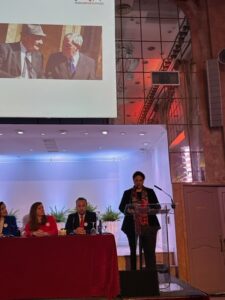
The first day of PAW kicked off with the keynote address by Dr Yas Banifatemi, founding partner of Gaillard Banifatemi Shelbaya Disputes. In keeping with PAW tradition, the keynote address dealt with the issue of diversity in international arbitration, enforcing the commitment of PAW to diversity, social and environmental responsibility, and innovation. Dr Banifatemi approached the topic by comparing the statistics concerning diversity in 2016 and 2023, and posed the question whether diversity should be perceived as a social value or as a destination. Within this framework, Dr Banifatemi posed several questions, by looking into the ICSID statistics on arbitrator appointments. Dr Banifatemi noted that parties are responsible for the appointment of arbitrators, but, ultimately, this has to be addressed in the broader context of diversity of seats of arbitration and applicable laws, which bare a direct consequence on the diversity of arbitrators. Furthermore, Dr Banifatemi highlighted that diversity is a moving target, a dynamic concept, which reflects society at a certain point in time. Ultimately, Dr Banifatemi concluded that diversity is a proxy for equality.
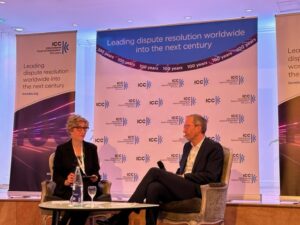 The day continued with the 7th ICC European Conference on International Arbitration entitled “Rethinking Dispute Resolution”, which began with the Fireside Chat with Claudia Salomon, President, ICC International Court of Arbitration and Henri Poupart-Lafarge, CEO, Alstom. The Fireside Chat focused on “Connecting the dots between business, technology, and dispute resolution in the 21st century” and addressed pressing issues such as climate change and technology innovation. Henri Poupart-Lafarge highlighted that while rail transportation is the most climate-friendly means of transportation, the decarbonization of the rail industry requires new technologies and smart green innovation.
The day continued with the 7th ICC European Conference on International Arbitration entitled “Rethinking Dispute Resolution”, which began with the Fireside Chat with Claudia Salomon, President, ICC International Court of Arbitration and Henri Poupart-Lafarge, CEO, Alstom. The Fireside Chat focused on “Connecting the dots between business, technology, and dispute resolution in the 21st century” and addressed pressing issues such as climate change and technology innovation. Henri Poupart-Lafarge highlighted that while rail transportation is the most climate-friendly means of transportation, the decarbonization of the rail industry requires new technologies and smart green innovation.
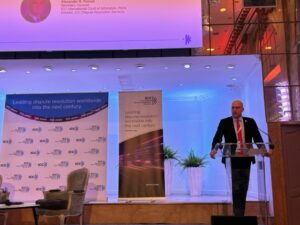 ICC Secretary General Alexander G. Fessas continued with the Introductory Speech of the 7th ICC European Conference. Alexander Fessas reminded the audience that in 2023 we are celebrating 100 years of the ICC International Court of Arbitration. In this context, the ICC International Court of Arbitration has issued the ICC Centenary Declaration on Dispute Prevention and Resolution, setting out a vision to shape the future of dispute resolution for the next century. Alexander Fessas stressed the importance of access to justice and the rule of law, and the fact that private justice that does not rest on solid institutional foundations will most certainly fail.
ICC Secretary General Alexander G. Fessas continued with the Introductory Speech of the 7th ICC European Conference. Alexander Fessas reminded the audience that in 2023 we are celebrating 100 years of the ICC International Court of Arbitration. In this context, the ICC International Court of Arbitration has issued the ICC Centenary Declaration on Dispute Prevention and Resolution, setting out a vision to shape the future of dispute resolution for the next century. Alexander Fessas stressed the importance of access to justice and the rule of law, and the fact that private justice that does not rest on solid institutional foundations will most certainly fail.
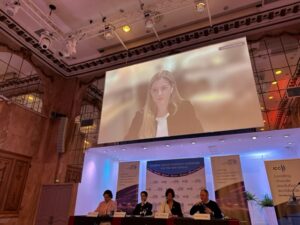 The first session of the 7th ICC European Conference on “Building Bridges: Crafting a blueprint for the future of dispute resolution” was moderated by Živa Filipič, Acting Deputy Secretary General, ICC International Court of Arbitration, and had as panellists Kai-Uwe Karl, Global Chief Litigation Counsel, GE Renewable Energy; Aisha Nadar, Senior Consultant, Procurement Management and Dispute Resolution, Advokatfirman Runeland; Sara Rayment, Founder, Inkling Legal Design; and Mikaël Schinazi, Associate, Gaillard Banifatemi Shelbaya Disputes. This panel explored the ways in which arbitration could be reimagined and reshaped, including by considering other alternative forms of dispute resolution to maximize their success in the next 100 years. Aisha Nadar encouraged the audience to go back to the basics before starting to reimagine the future. Sara Rayment, along the same lines, suggested that a paradigm shift is needed and for this, users of arbitration should adopt a holistic problem solving approach, which may require a completely new skillset. Mikaël Schinazi suggested that lessons can be learned from the past, in particular from the success story of the ICC International Court of Arbitration, which was established by outsiders of the world of international arbitration. Kai-Uwe Karl emphasized the fact that the notion of urgency in climate change mitigation must also be imported into arbitration. For this, Kai-Uwe Karl explained, users have the necessary tools but they need a shift in their approach to dispute resolution, which now is mainly confrontational.
The first session of the 7th ICC European Conference on “Building Bridges: Crafting a blueprint for the future of dispute resolution” was moderated by Živa Filipič, Acting Deputy Secretary General, ICC International Court of Arbitration, and had as panellists Kai-Uwe Karl, Global Chief Litigation Counsel, GE Renewable Energy; Aisha Nadar, Senior Consultant, Procurement Management and Dispute Resolution, Advokatfirman Runeland; Sara Rayment, Founder, Inkling Legal Design; and Mikaël Schinazi, Associate, Gaillard Banifatemi Shelbaya Disputes. This panel explored the ways in which arbitration could be reimagined and reshaped, including by considering other alternative forms of dispute resolution to maximize their success in the next 100 years. Aisha Nadar encouraged the audience to go back to the basics before starting to reimagine the future. Sara Rayment, along the same lines, suggested that a paradigm shift is needed and for this, users of arbitration should adopt a holistic problem solving approach, which may require a completely new skillset. Mikaël Schinazi suggested that lessons can be learned from the past, in particular from the success story of the ICC International Court of Arbitration, which was established by outsiders of the world of international arbitration. Kai-Uwe Karl emphasized the fact that the notion of urgency in climate change mitigation must also be imported into arbitration. For this, Kai-Uwe Karl explained, users have the necessary tools but they need a shift in their approach to dispute resolution, which now is mainly confrontational.
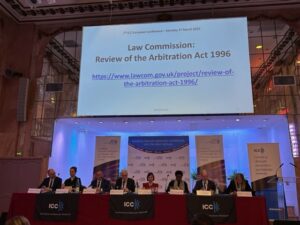 The second session of the 7th ICC European Conference addressed the “Crossing Pitfalls: Navigating arbitration’s potential risks and challenges” and was moderated by Elena Gutierrez García de Cortázar, Partner, Mourre Gutierrez Chessa Arbitration; and by Ndanga Kamau, Founder, Ndanga Kamau Law, and Vice-President, ICC International Court of Arbitration. The panel addressed the risks and challenges that arbitration may face in the future, focusing on arbitral reform, transparency and confidentiality, and regulatory and compliance. Sir Bernard Eder, International Arbitrator and Mediator, 24 Lincoln’s Inn Fields, addressed the reform of the English Arbitration Act and the Law Commission Review of the Arbitration Act 1996 and, in particular, the reform of Section 69. Dominique Hascher, Judge, Supreme Judicial Court of France; and former General Counsel and Deputy Secretary General, ICC International Court of Arbitration, highlighted that the allocation of jurisdiction between courts and arbitral tribunals is an ongoing issue, but that jurisdiction should also be understood as the power to adjudicate and, as such, it cannot be left to the pleading skills of the party in the arbitration. Brooks Daly, Independent Arbitrator, turned the attention of the panel to the issues of transparency and confidentiality in international Arbitration. Brooks Daly submitted three proposals to the audience: first, that no consent should be needed for award publication, with an automatic moratorium after which the award becomes public; second, the proposal for a blind procedure for the appointment of arbitrators, with the implementation of a list procedure; and third, the implementation of a searchable video archive of arbitration hearings. Alma Forgo, Head of Arbitration, Airbus SAS, highlighted the fact that users resort to arbitration because it is fast and confidential. Alma Forgo rejected Brooks Daly’s first proposal noting that parties are rarely concerned with the development of law, argument usually used in advancing the transparency of arbitration. Jacob Grierson, Partner, Asafo & Co., France; and Anna-Maria Tamminen, Partner, Hannes Snellman Attorneys Ltd, addressed the issues of regulatory and compliance in international arbitration and, to what extent regulatory disputes are arbitrable. Both panellists emphasized the increasing impact of ESG (environmental, social, and governance) in international arbitration, in the context of Covid-19, the rise of artificial intelligence, climate change mitigation, banking scandals and economic sanctions.
The second session of the 7th ICC European Conference addressed the “Crossing Pitfalls: Navigating arbitration’s potential risks and challenges” and was moderated by Elena Gutierrez García de Cortázar, Partner, Mourre Gutierrez Chessa Arbitration; and by Ndanga Kamau, Founder, Ndanga Kamau Law, and Vice-President, ICC International Court of Arbitration. The panel addressed the risks and challenges that arbitration may face in the future, focusing on arbitral reform, transparency and confidentiality, and regulatory and compliance. Sir Bernard Eder, International Arbitrator and Mediator, 24 Lincoln’s Inn Fields, addressed the reform of the English Arbitration Act and the Law Commission Review of the Arbitration Act 1996 and, in particular, the reform of Section 69. Dominique Hascher, Judge, Supreme Judicial Court of France; and former General Counsel and Deputy Secretary General, ICC International Court of Arbitration, highlighted that the allocation of jurisdiction between courts and arbitral tribunals is an ongoing issue, but that jurisdiction should also be understood as the power to adjudicate and, as such, it cannot be left to the pleading skills of the party in the arbitration. Brooks Daly, Independent Arbitrator, turned the attention of the panel to the issues of transparency and confidentiality in international Arbitration. Brooks Daly submitted three proposals to the audience: first, that no consent should be needed for award publication, with an automatic moratorium after which the award becomes public; second, the proposal for a blind procedure for the appointment of arbitrators, with the implementation of a list procedure; and third, the implementation of a searchable video archive of arbitration hearings. Alma Forgo, Head of Arbitration, Airbus SAS, highlighted the fact that users resort to arbitration because it is fast and confidential. Alma Forgo rejected Brooks Daly’s first proposal noting that parties are rarely concerned with the development of law, argument usually used in advancing the transparency of arbitration. Jacob Grierson, Partner, Asafo & Co., France; and Anna-Maria Tamminen, Partner, Hannes Snellman Attorneys Ltd, addressed the issues of regulatory and compliance in international arbitration and, to what extent regulatory disputes are arbitrable. Both panellists emphasized the increasing impact of ESG (environmental, social, and governance) in international arbitration, in the context of Covid-19, the rise of artificial intelligence, climate change mitigation, banking scandals and economic sanctions.
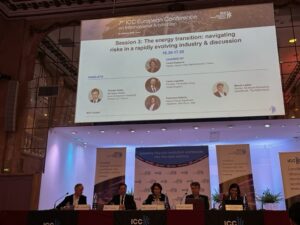 The third session of the 7th ICC European Conference was moderated by Carine Dupeyron, Partner, Darrois Villey Maillot Brochier, and addressed the hot topic of “Energy Transition: Navigating risks in a rapidly evolving industry”. The panel explored the risks and challenges that come with the energy transition, including the adoption of renewable energy sources, the implementation of energy storage solutions, and the influence of policy on its success. Francesca Salerno, Head of Group Significant Litigations, Enel S.p.A., highlighted the need to approach the energy transition from a holistic point of view, which, for Enel, is reflected in the full decarbonization of energy resources, the full digitalization of the grids, and the need to increase the number of charging points for electrical vehicles in the countries in which Enel is present. Nonetheless, Francesca Salerno pointed out that investors face significant hurdles, in particular when it comes to the legal certainty and the evolving power of States to regulate and change their legal framework. Thomas Voisin, Managing Partner, Quinn Emanuel, emphasized the fact that energy transition may be understood differently around the globe, and that energy markets have always been sensitive to various factors, in particular to the geopolitical ones. Ultimately, Thomas Voisin explained, energy transition is about how to allocate risks so that players can continue in the market. Marnix Leijten, Partner, De Brauw Blackstone Westbroek, focused on the Energy Charter Treaty and its modernization process. Marnix Leijten explained that investors are currently not experiencing a stable, predictable and transparent investment environment, in particular in the context of a high risk in renewable investment per se. Carlos Lapuerta, Principal, The Brattle Group, continued the discussion on the Energy Charter Treaty and posed the question as to why the Treaty started to be challenged. In this context, Carlos Lapuerta reflected upon the Dutch coal phase out which generated the ICSID cases brought by RWE and Uniper against the Netherlands. Concluding, Carlos Lapuerta mentioned that the Energy Charter Treaty is, indeed, a tool for stability, including for renewable investments.
The third session of the 7th ICC European Conference was moderated by Carine Dupeyron, Partner, Darrois Villey Maillot Brochier, and addressed the hot topic of “Energy Transition: Navigating risks in a rapidly evolving industry”. The panel explored the risks and challenges that come with the energy transition, including the adoption of renewable energy sources, the implementation of energy storage solutions, and the influence of policy on its success. Francesca Salerno, Head of Group Significant Litigations, Enel S.p.A., highlighted the need to approach the energy transition from a holistic point of view, which, for Enel, is reflected in the full decarbonization of energy resources, the full digitalization of the grids, and the need to increase the number of charging points for electrical vehicles in the countries in which Enel is present. Nonetheless, Francesca Salerno pointed out that investors face significant hurdles, in particular when it comes to the legal certainty and the evolving power of States to regulate and change their legal framework. Thomas Voisin, Managing Partner, Quinn Emanuel, emphasized the fact that energy transition may be understood differently around the globe, and that energy markets have always been sensitive to various factors, in particular to the geopolitical ones. Ultimately, Thomas Voisin explained, energy transition is about how to allocate risks so that players can continue in the market. Marnix Leijten, Partner, De Brauw Blackstone Westbroek, focused on the Energy Charter Treaty and its modernization process. Marnix Leijten explained that investors are currently not experiencing a stable, predictable and transparent investment environment, in particular in the context of a high risk in renewable investment per se. Carlos Lapuerta, Principal, The Brattle Group, continued the discussion on the Energy Charter Treaty and posed the question as to why the Treaty started to be challenged. In this context, Carlos Lapuerta reflected upon the Dutch coal phase out which generated the ICSID cases brought by RWE and Uniper against the Netherlands. Concluding, Carlos Lapuerta mentioned that the Energy Charter Treaty is, indeed, a tool for stability, including for renewable investments.
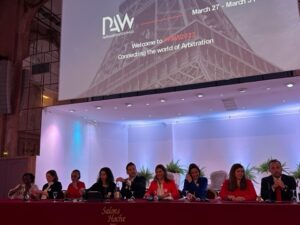
In his concluding remarks, Ulrich Kopetzki, Acting Director for Europe, ICC Dispute Resolution Services, encouraged the audience to continue to be excited about the future of arbitration, by starting to build bridges and reflect upon a paradigm shift, but also be mindful about the pitfalls and to continue to ensure the legitimacy of arbitration in the eyes of its users.
 The first day of 2023 PAW concluded with the opening cocktail at the Economic, Social and Environmental Council in Paris.
The first day of 2023 PAW concluded with the opening cocktail at the Economic, Social and Environmental Council in Paris.
More coverage from 2023 PAW is available here.
________________________
To make sure you do not miss out on regular updates from the Kluwer Arbitration Blog, please subscribe here. To submit a proposal for a blog post, please consult our Editorial Guidelines.


